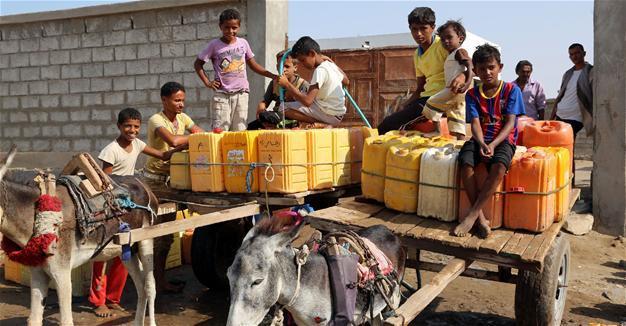UN announces agreement on 72-hour Yemen cease-fire
SANAA – The Associated Press

The warring parties in Yemen have agreed to a 72-hour cease-fire that will take effect shortly before midnight on Oct. 19, the U.N. special envoy to Yemen said.
Special Envoy Ismail Ould Cheikh Ahmed said he hopes the temporary truce can lead to “permanent and lasting end to the conflict.”
Ahmed said in a statement late Oct. 17 that he received assurances from all parties to the conflict to cease hostilities at 11:59 p.m. local time on Oct. 19 for an initial period of 72 hours that is subject to renewal.
The warring factions agreed to follow the conditions of a temporary April cease-fire agreement, he said. The agreement requires them to “to allow free and unhindered access for humanitarian supplies and personnel” to all parts of Yemen, he said.
Yemeni President Abedrabbo Mansour Hadi’s government and its Saudi backers said they would support the truce. The Houthi-run administration also welcomed the cease-fire.
U.S. Secretary of State John Kerry called on Yemen’s warring parties to take the necessary measures to implement the cease-fire, “sustain it, and strongly encourage its unconditional renewal.”
“We note again that [a] peaceful resolution of this conflict requires compromises and commitments by everyone,” Kerry said in a statement. “The United States, alongside the international community, is ready to provide assistance and will continue to work with all parties to conclude a negotiated settlement that will bring a permanent and lasting end to the conflict.”
The war in Yemen began in 2014 when Shiite rebels known as Houthis based in the north seized the capital, Sanaa and later swept across much of the poor Arabian Peninsula country with the help of army units loyal to former President Ali Abdullah Saleh.
In March 2015, Saudi Arabia and its Gulf allies launched a campaign of airstrikes against the rebels. The Saudi-led coalition and the United States are backing the internationally recognized government of Hadi, whose loyalists now control most of Yemen’s south and are slowly driving out the Houthis and their allies from northern provinces.
More than 4,000 civilians have been killed and 3 million of the country’s 26 million people have been driven from their homes by the fighting. Hunger has become widespread in the Arab world’s poorest country.
The southern city of Taez is one of the hardest-hit areas.
Foreign Minister Abdel-Malak al-Mukhlafi demanded late Monday that a months-long siege of the city be lifted as part of the cease-fire agreement and that relief supplies be delivered to its residents without conditions.
“Peace is our permanent choice,” he said.
The cease-fire agreement was announced late Oct. 17, a day after Ahmed, the U.N. envoy, met in London with Kerry and British Foreign Secretary Boris Johnson.
“This is the time to implement a cease-fire unconditionally and then move to the negotiating table,” Kerry said after the Oct. 16 meeting.
 The warring parties in Yemen have agreed to a 72-hour cease-fire that will take effect shortly before midnight on Oct. 19, the U.N. special envoy to Yemen said.
The warring parties in Yemen have agreed to a 72-hour cease-fire that will take effect shortly before midnight on Oct. 19, the U.N. special envoy to Yemen said.